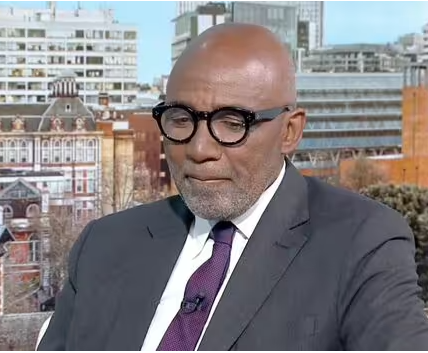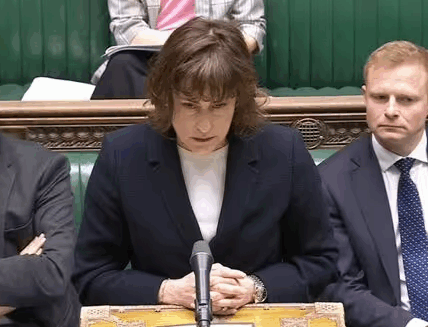Prime Minister brands Reform UK leader as ‘Liz Truss 2.0’ as he fights to stop former Labour supporters deserting his party for Reform

Sir Keir Starmer delivering his speech at Glass Futures in St Helens (Image: Getty)
This is a milestone moment in British politics. Sir Keir Starmer said the stark choice facing the country was between Labour and Nigel Farage.
It takes a moment to sink in. A Labour Prime Minister thinks his biggest opponent is not the leader of the Conservative Party but this veteran Brexiteer. For the PM, Reform UK is the party to beat – and his strategy is to brand Mr Farage as the second coming of Liz Truss.
Mr Farage will be thrilled at the attention. Even before the General Election, he promised that Reform would be the real opposition to Labour.
The Labour leader summoned journalists to a cavernous factory floor in a once safe Labour constituency to denounce the rival leader as a threat to the prosperity of working families. He wants the country to think the Reform leader would unleash the turmoil that Ms Truss’s mini-Budget did.
“What Nigel Farage is doing is Liz Truss 2.0,” he said.
Sir Keir made the case that the Conservatives are a party in a crisis of collapse, saying: “Look, I do think that the Conservative Party has run out of road. Their project is faltering, they are in decline, they are sliding into the abyss and it’s very important that we say that and identify that.
“But equally, politics is about choices – and the choice at the moment is between the choice of a Labour Government that thinks stable finances are at the heart of building better lives for working people or Nigel Farage and Reform who only this week said they would spend billions upon billions upon billions – tens of billions of pounds – in an unfunded way, which is the exact repeat of what Liz Truss did.”
He delivered his speech at Glass Futures, a research and development centre in St Helens dedicated to developing low-carbon glass. It comes just days after Reform pledged to reverse Labour’s cuts to winter fuel payments to scrap the two-child benefit cap.
Sir Keir accused Reform of putting “poison into our politics” and trying to create “toxic” divides.
When asked if he was panicking at Reform’s lead in the polls, Sir Keir took a potshot at the Reform leader, stressing his own working-class roots.
“I want to protect working people from Nigel Farage because I want to protect them from what he would do, which is exactly the same as Liz Truss, which would have a direct impact on their lives … I don’t need lectures from Nigel Farage on what it means to be [working] people.
“I know what it means to work 10 hours a day in a factory five days a week – and I know that because that is what my dad did every single working day of his life, and that’s what I grew up with.
“So, I don’t need lessons from Nigel Farage about the issues that matter most to working people in this country.”
One of the most significant things about the Prime Minister’s visit to St Helens South and Whiston is that it happened in the first place. This should be the definition of a safe Labour seat – does Sir Keir need to campaign here?
Local Labour MP Marie Rimmer won it with a majority of 11,945 in the General Election – but this was down from 19,122 in 2019 and 24,343 in 2017. Reform came second last year and it is this type of Labour heartland constituency where Mr Farage wants to triumph.
Until this month’s local elections, Labour apparatchiks who did not want to face up to the rise of Reform could dismiss it as a protest party that got lucky by winning five MPs in the summer. But Reform’s narrow victory in the Runcorn and Helsby by-election – and its taking of hundreds of council seats and two mayoralties – demonstrates it is now driven not by hype but true momentum.
Crucially, the May elections showed Reform can get its voters to the polls. MPs in other parties had hoped Reform would lack the intelligence and grassroots organisation to get out its vote. Reform proved it can propel people to polling stations, and its data on likely voters will be even stronger by the time of the next general election.
Sir Keir is taking a risk by attacking Mr Farage head-on. One of the traditional rules of campaigning is you do not mention your opponent’s name for fear of giving them publicity – something the former Ukip leader has never lacked.
It is possible Sir Keir is pursuing a crafty strategy to talk up Reform and split the Right-wing vote so he can once again win a landslide with less than 34% of the vote. He may hope panic in Tory circles will force another leadership election, wiping out Kemi Badenoch’s attempts to portray the Conservatives as a party of stability.
But it is just as likely that he is really concerned about Reform and wants to halt its advance. Labour is haunted by the nightmare of how Scotland – a nation whose political map once glowed red – abandoned the party in 2015. Then, Ed Miliband watched as Labour lost 40 of its 41 seats as the SNP led a democratic revolt against the Scottish establishment.
The nightmare for Sir Keir and his comrades is that Reform orchestrates a similar transformation of politics in England and Wales. A key test will come with next year’s elections to the Senedd, the Welsh Parliament.
Labour has always led the Welsh Government but there are deep worries that voters whom Boris Johnson could not persuade to vote Conservative will not hesitate to back Reform. Despite the nation’s strong Left-wing traditions, a majority voted for Brexit and Mr Farage will hope to tap into a wealth of local frustrations.
If Reform takes Wales, then Labour will launch a full-scale emergency operation to save the Red Wall. Supporters in seats where they have weighed the votes for generations will have to learn new tricks fast.
Otherwise, Labour’s majority could shatter like glass.


